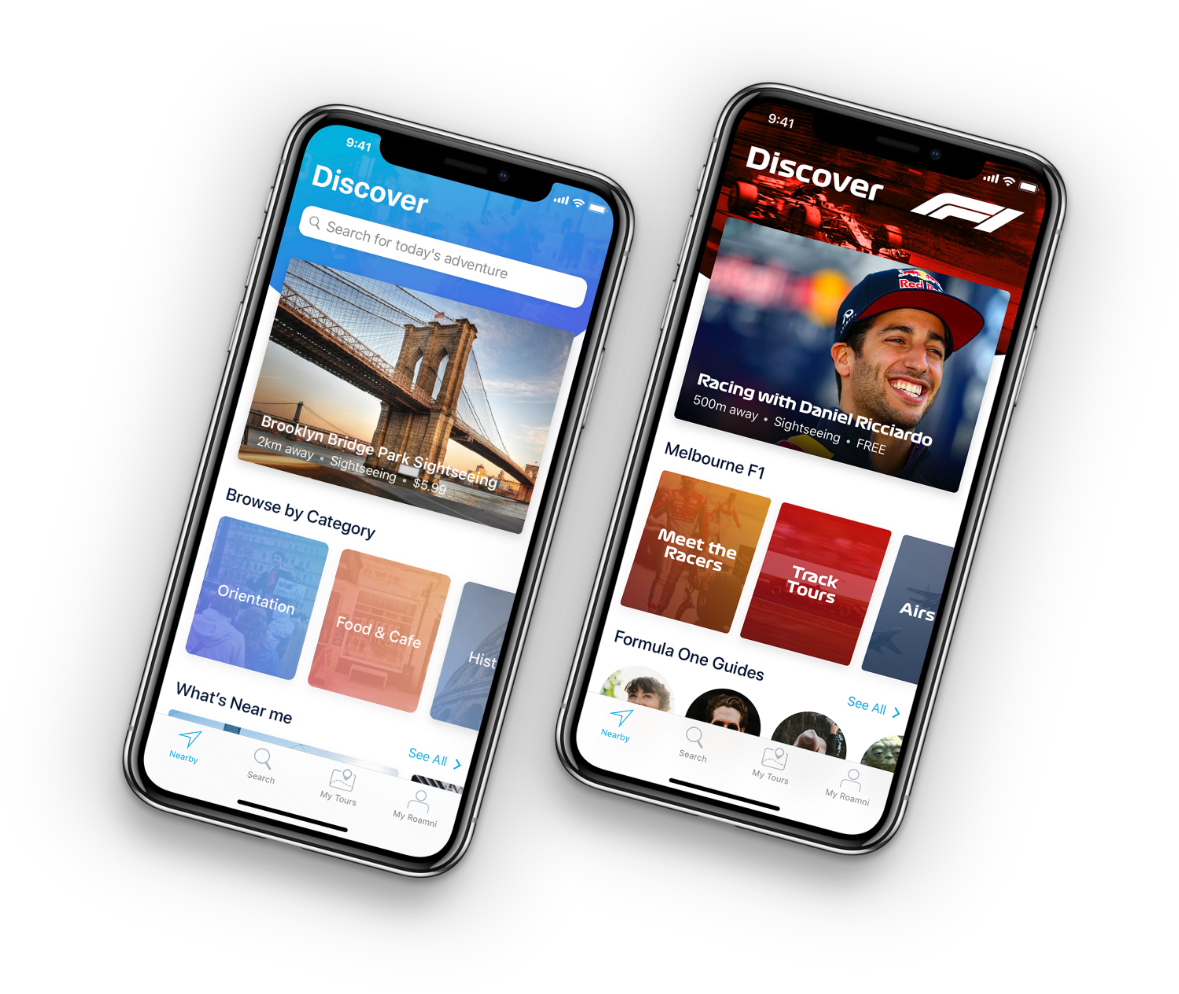The 7 Best Sleep Apps for More Restful Nights in 2026
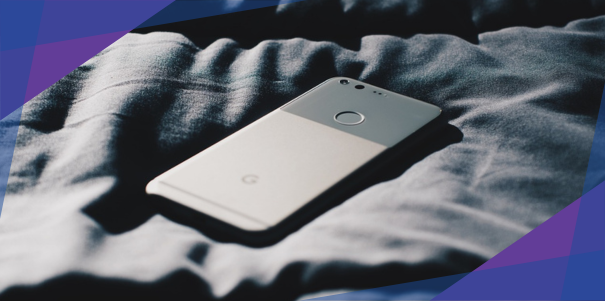
Have you slept well lately?
If you haven’t, you are not alone. A global study indicates around 4,800 respondents across 12 countries suffer from poor sleep quality.
This statistic, combined with the health conditions linked to lack of sleep, poses a serious public health concern.
But, there’s a silver lining.
There are many mobile applications and web apps so you can enhance your overall well-being through quality sleep.
Continue reading to discover the advantages, disadvantages, pricing details, and distinctive features of today’s 7 best sleep apps. The first three apps below address mental health issues on top of sleep problems, while the last four applications focus on sleep improvement (select any app below to navigate directly to our reviews).
- Calm: Best in content variety and accessibility
- Headspace: Best sleep aid for meditation beginners
- Breethe: Best for integrating hypnotherapy
- Slumber: Best in sleep enhancement
- Sleep Cycle: Best for tracking sleep data
- Pillow: Best for integrating multiple health data
- Pzizz: Best in casual stories and dynamic content
Let’s jump right in!
Relax and refresh your mind and body with the 7 best sleeping apps
Our list of the 7 best sleeping apps is created by our team of forward-thinking developers, designers, and growth strategists. We have extensive experience building and growing apps with impressive user engagement metrics and substantial financial success. In our selection, we consider the sleeping apps’ performance, uniqueness, industry recognition, and overall user experience within each app.
Here are the sleep apps that made it to our list:
1. Calm: Best in content variety and accessibility
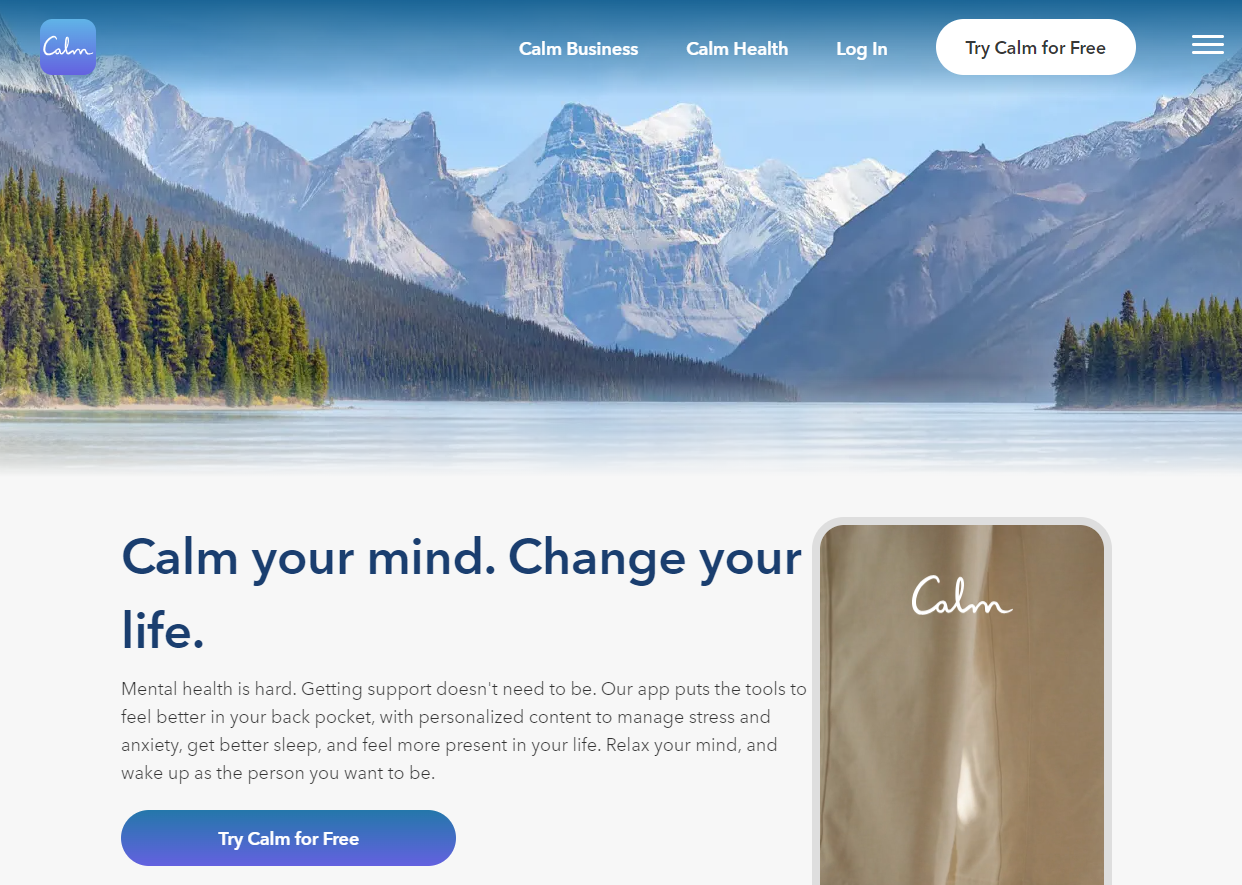
Source: Calm Official Website
Though Calm is more of a mental health app, its versatility enables it to address sleep problems uniquely.
The app has a comprehensive toolkit for relaxation and meditation designed to improve psychological well-being and enhance sleep quality.
Among its standout offerings are Sleep Stories, which are narrations done by celebrities like Matthew McConaughey and Harry Styles. The developers behind the app have designed the spoken tales to lull listeners into a deep slumber.
Furthermore, the app offers a feature called Soundscapes. From the gentle rustle of leaves in a forest to the rhythmic patter of raindrops on a windowpane, this audio content aims to induce a state of deep relaxation conducive to restful sleep.
For people having trouble with stress and anxiety, Calm also has a rich collection of guided meditations, which range from brief three-minute sessions to more immersive 25-minute psycho-spiritual journeys. Whether you’re a novice seeking solace or a seasoned practitioner craving deeper insights, Calm’s guided meditations cater to diverse needs and experience levels.
Calm also offers practical breathing exercises proven to alleviate stress, anxiety, and other negative emotions. By incorporating these simple yet potent techniques into your nightly routine, you can cultivate a sense of calm and serenity amidst life’s chaos. This can pave the way for uninterrupted sleep and enhanced well-being.
The features and content of Calm are also accessible across various digital devices like wearables, desktop computers, laptops, and multimedia systems like Sonos.
The diversity, quality, and wide-ranging accessibility of Calm’s features have contributed to its reputation in both industry circles and user pools. Apple deemed the app worthy of an App of the Year award in 2017. And out of a maximum score of 5 stars, Calm has garnered 4.4 and 4.8 stars on Google Play and the App Store, respectively.
However, no app is without its imperfections, and Calm is no exception. While the app offers a selection of free features, accessing the full breadth of its content requires a premium subscription. For instance, much of the Sleep Stories and Soundscape content is locked from free users.
Additionally, there is some concern about the app’s data collection practices, prompting cautious scrutiny from privacy-conscious individuals.
Despite its flaws, Calm is the best sleep app for people looking for a decent set of free features and holistic treatment of their sleep problems. And if you think the app resonates with your needs but are concerned with its data collection procedures, there are measures you can take to lessen your data’s exposure.
Pricing:
- Free (basic features and limited content)
- Monthly: $14.99
- Annually: Starts at $69.99
Pros:
- Comprehensive toolkit for relaxation, meditation, and sleep improvement.
- Free website-based content on sleep and mental health
- Wide-ranging multimedia and multi-platform compatibility
Cons:
- Full access to content requires a premium subscription
- Some data privacy concerns
Device compatibility:
🖥️ 💻 Desktop, laptop
📺Apple TV, Samsung TV
⌚Apple Watch, Google WearOS
📻 Sonos
📲 Android, iOS
Relevant app links:
💡 ⚙️ Learn More and Access the App Via Official Website
👉 Download Mobile App Via Google Play
👉 Download Mobile App Via App Store
2. Headspace: Best sleep aid for meditation beginners
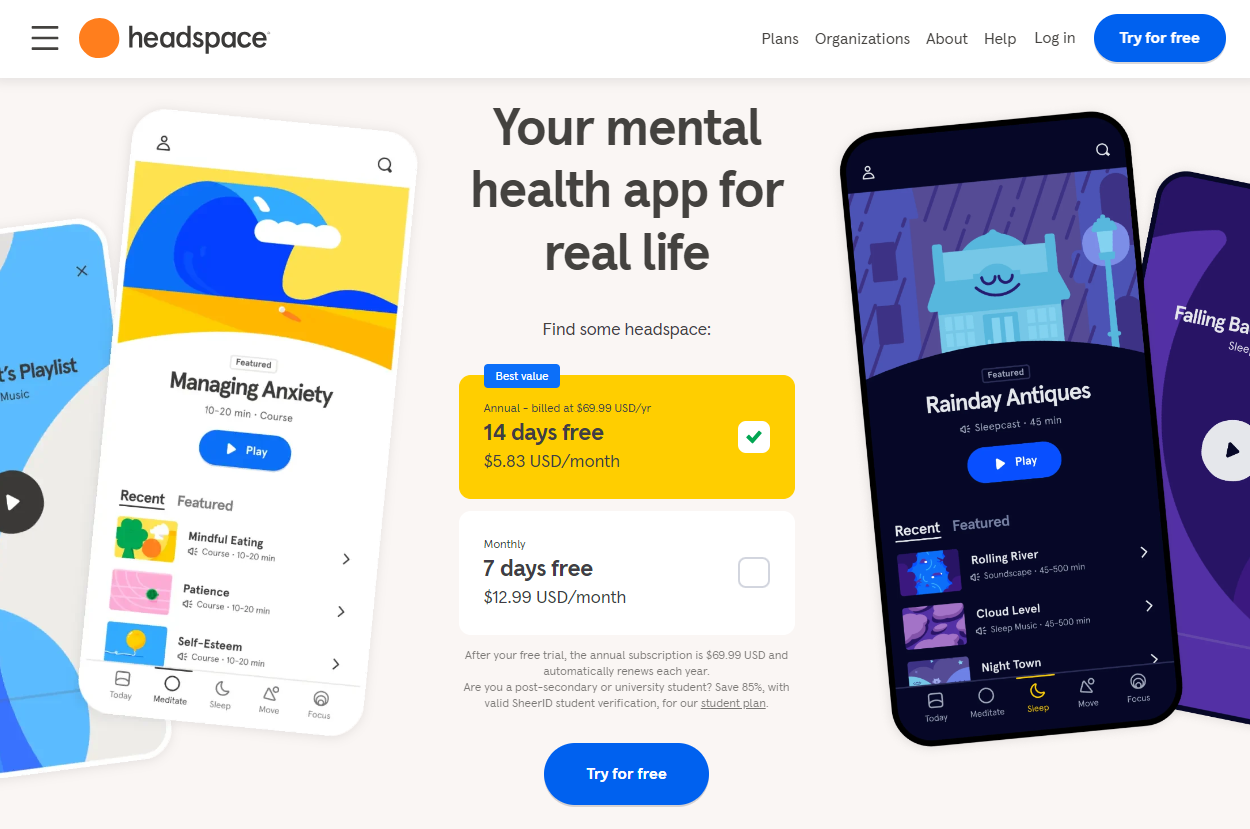
Source: Headspace Official Website
Though Headspace shares many feature similarities with Calm, most of its content focuses on structured meditation programs.
If you’re having trouble sleeping and don’t have much experience with meditation exercises, Headspace will provide you with guided courses to help get you started. You can use these lessons to address sleep problems and other psychological conditions.
But in terms of sleep-focused features, Headspace has Sleepcasts, Soundscapes, and a course on sleep health.
Sleepcasts enables you to choose narrated tales or soothing soundscapes meticulously curated to help you fall asleep. These auditory experiences create a serene atmosphere ideal for drifting off to sleep effortlessly.
Meanwhile, Soundscapes lets you customize and select calming melodies and ambient sounds to foster a peaceful sleep environment, allowing you to unwind better.
Additionally, Headscape offers educational content on sleep. Its Sleep Health course is a product of collaboration with scientific experts. Once you get into this course, you will get access to invaluable tools and exercises aimed at cultivating healthier sleep habits, empowering you to take control of your sleep wellness.
Beyond its sleep-centric offerings, the app extends its reach to address various mental wellness needs. With a diverse toolkit of meditations for stress management, focus enhancement, anxiety reduction, etc., the app is a holistic companion on the journey to overall well-being.
The comprehensive and science-backed features offered by Headspace have translated into tangible benefits. Research has confirmed the app’s effectiveness in improving the condition of people suffering from mental health issues like depression, stress, and anxiety.
While Headspace undoubtedly offers a wealth of benefits, it has its limitations. The app operates on a subscription-based model, requiring users to commit financially to gain full access to Headspace’s extensive library of features. The Sleep Health course is one of the perks that users have to pay for.
These disadvantages do not negate the fact that Headspace is a formidable ally in the quest for improved sleep and overall well-being.
Pricing:
- Free (for a limited time of 7 to 14 days)
- Annual (Non-student Plan): $69.99
- Monthly (Non-student Plan): $12.99
- Annual (Student Plan): $9.99
- Monthly (Student Plan): $0.83
- Annual (Six-Account Family Plan): $99.99
Pros:
- Beginner-friendly meditation and sleep health programs
- Customizable melodies and ambient sounds
- Scientific courses on sleep health
- Diverse toolkit for mental health and sleep quality
Cons:
- High-value course on sleep health locked from free users
Device compatibility:
📲 Android, iOS
🖥️ 💻 Desktop, laptop (limited user experience compared to mobile app version)
Relevant app links:
💡⚙️ Learn More about and Use the App Via Official Website
👉 Download Mobile App Via Google Play
👉 Download Mobile App Via App Store
3. Breethe: Best for integrating hypnotherapy
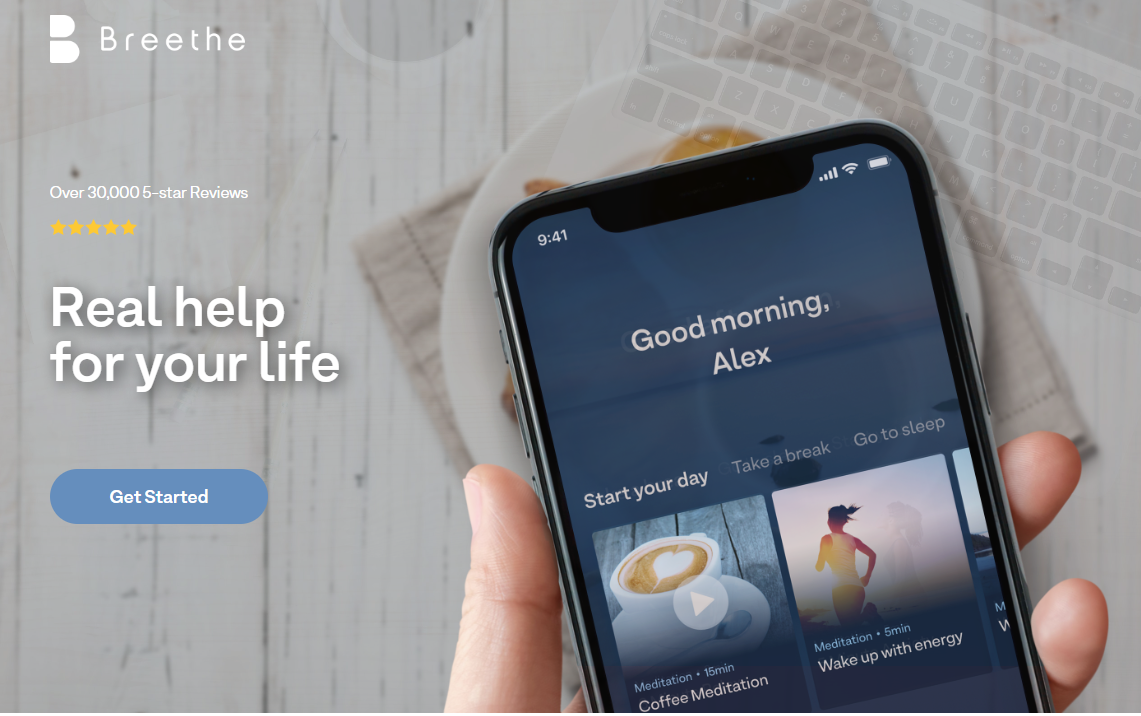
Source: Breethe Official Website
The hypnotherapy component is Breethe’s ace up its sleeve.
Hypnotherapy could be a stronger “sleeping pill” compared to narrations or bedtime stories. After all, some research shows that hypnosis makes people more open to suggestions and behavior changes.
Though some studies highlight the power of hypnotherapy in addressing sleep problems, you should still consult your healthcare provider to ensure your compatibility with this form of treatment.
But if your doctor gives you the go-signal, you can customize the app’s hypnotherapy sessions to address your needs. For instance, if you chose the session for insomnia, a narrator could prompt you to imagine walking along the beach and eventually climbing a staircase.
On top of hypnotherapy, the app also has many of the same functionalities found in other high-quality sleeping apps. Breethe aims to reduce stress, enhance sleep, and increase overall well-being through various features, such as guided meditations, soothing music, and sleep stories.
But Breethe is not flawless. For instance, most of the app’s content is reserved for paying subscribers. But the need to pay is offset by the option of a one-time payment, which many other sleep applications don’t have.
Another downside to the app is that even some of its premium users think Breethe has an overwhelming amount of options.
But overall, the minor downsides of Breethe are overshadowed by its versatility and creativity in addressing sleep problems and other mental health concerns.
Pricing:
- Free (limited content)
- Monthly: $12.99
- Annual: $89.00
- Lifetime: $170.00 (one-time payment)
Pros:
- Customizable hypnotherapy sessions tailored to individual needs
- Availability of one-time payment option
Cons:
- Limited content for free users
- Feature quantity may be overwhelming
Device compatibility:
📲 Android, iOS
Relevant app links:
💡 Learn More about the App Via Official Website
👉 Download Mobile App Via Google Play
👉 Download Mobile App Via App Store
4. Slumber: Best in sleep enhancement
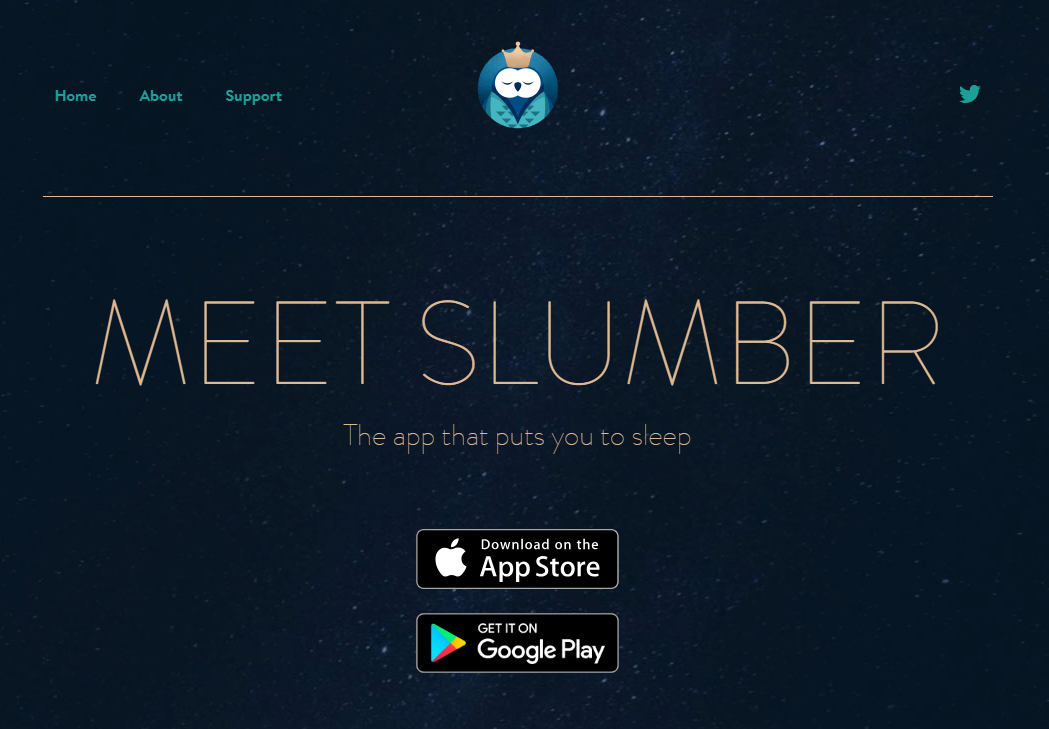
Source: Slumber Official Website
Slumber is more a specialist than a Swiss Army knife.
Unlike other sleep apps that also seek to address mental health and other wellness issues, Slumber is solely dedicated to sleep improvement.
As of writing, Slumber has over 800 sleep-inducing stories. The narrations utilize guided imagery, helping you feel like an active participant. Bedtime stories range from children-oriented to those designed by therapeutic hypnotists. Best of all, you can set the stories to play continuously until you fall asleep.
The app also has what is called Music & Soundscapes. This feature set adds a rich layer of audio to your relaxing bedtime stories. Slumber allows you to customize the volume and type of sound you want to accompany your chosen story. For instance, you can listen to a story about Rapunzel while hearing the sounds of riverine waters and rain.
Slumber’s content generally utilizes a mind-body approach to improve relaxation and encourage sleep. The app incorporates techniques like mindfulness, breath control, and progressive muscle relaxation to improve sleep quality and quantity.
On top of all these good features, the app’s developers update its content weekly.
Though the app has the common weakness of having limited free content, it offers much value for a relatively accessible price.
Pricing:
- Free (limited time, limited content)
- Monthly: Starts at $7.99
- Annual: Starts at $39.99
Pros:
- Frequently updated content
- Customizable audio layer on top of narrations
- Mind-body approach to sleep improvement
- Relatively accessible price for its monthly package
Cons:
- Limited free content
Device compatibility:
📲 Android, iOS
Relevant app links:
💡 Learn More about the App Via Official Website
👉 Download Mobile App Via Google Play
👉 Download Mobile App Via App Store
5. Sleep Cycle: Best for tracking sleep data
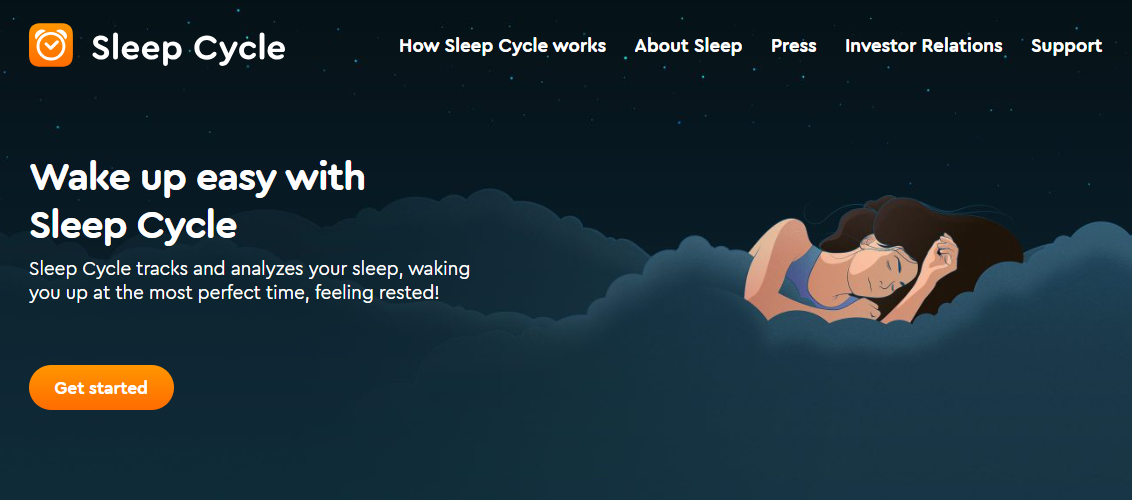
Source: Sleep Cycle Official Website
Like Slumber, Sleep Cycle focuses on addressing sleep problems. However, it has a slightly different toolkit to address these concerns.
Sleep Cycle combines sleep tracking with a smart alarm clock feature to provide users with a comprehensive tool for improving sleep quality.
The app has a unique way of tracking sleep. Unlike other sleep-tracking apps that require placing the phone under the pillow, Sleep Cycle uses your phone’s microphone to monitor your sleep patterns. The app takes note every time you snore, cough, or speak. Sleep Cycle’s science-based algorithm then analyzes your recorded sleep data and provides tailored and actionable tips for enhancing sleep.
Sleep Cycle can also use your sleep data to determine your optimal waking time. The app’s smart alarm clock gently wakes you up at the best possible time conducive to your health, depending on your sleep patterns. Compared to traditional alarms that might disrupt deep sleep cycles, this gentle awakening feature can lead to a more refreshed feeling upon waking.
The tracking and measurement functionalities of Sleep Cycle are not exclusive to mobile devices. You can integrate these features into other platforms like the Apple Health app and wearables, such as Apple Watch and Android WearOS.
On top of all these advantages, the app offers a diverse library of relaxing sounds to help you unwind and prepare for sleep. From nature sounds to white noise, options cater to various preferences and can contribute to a more peaceful bedtime routine.
Despite all these useful features, Sleep Cycle has some downsides. For instance, some users have reported that the app’s sleep tracker occasionally suffers from inaccuracies. And critical features like snore and sound detection are reserved for paying users.
Drawbacks aside, Sleep Cycle is one of the most unique sleeping apps because it incorporates sleep metrics to provide users with educational and actionable insights.
Pricing:
- Free (for a limited time, limited set of features)
- Monthly: Around $10
- Annual: Around $40
Pros:
- Sleep tracking functionality
- Smart alarm for gentle waking
- Customized and data-driven insights for improving sleep quality
- Integration with Apple Health and wearable platforms
- Diverse library of relaxation-inducing content
Cons:
- Some alleged inaccuracies in sleep tracking
- Basic tracking only for free users
Device compatibility:
📲 Android, iOS, Apple Health
⌚Apple Watch, Android WearOS
Relevant app links:
💡 Learn More about the App Via Official Website
👉 Download Mobile App Via Google Play
👉 Download Mobile App Via App Store
6. Pillow: Best for integrating multiple health data
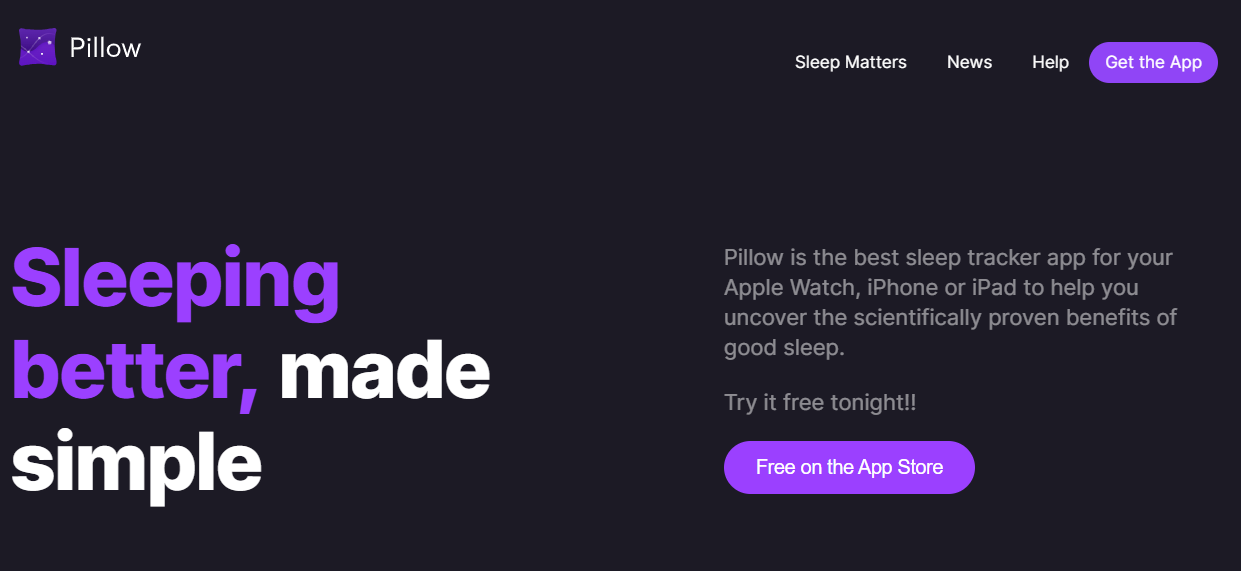
Source: Pillow Official Website
Pillow tracks sleep meticulously like Sleep Cycle, but with a twist.
Sleep Cycle and Pillow share many common elements. Save for the fact that Pillow is exclusively made for Apple hardware and software, the app also uses a microphone to meticulously monitor sleep patterns, its users’ bodily movements, and ambient sounds. Like Sleep Cycle, Pillow also has a smart alarm that rouses users gently during their lightest sleep phase. Moreover, Pillow also provides in-depth sleep data like Sleep Cycle.
But what sets Pillow apart from Sleep Cycle is its integration with other health data. It allows users to correlate sleep metrics with other well-being factors like vital signs, physical activity, weight, and caffeine consumption.
For example, if you’re using an Apple Watch or another Apple-supported device to track your heart rate during sleep, the Apple Health app can record this vital sign. Once you integrate Apple Health with Pillow, the sleep app will factor in your recorded vital stats when making recommendations to improve your sleeping habits and patterns.
Now what if you used your Apple Watch to track your number of steps instead of your heart rate? As long as your Apple Watch, Apple Health, and Pillow are synced, the sleep app can still customize its sleep-health insights using the said exercise metric.
This integration with different types of health and workout data makes Pillow a unique and effective app when it comes to offering holistic insights into sleep health. Ultimately, Pillow is good at highlighting the interplay between lifestyle choices and sleep quality.
While primarily a sleep tracker, Pillow incorporates additional features to facilitate better sleep. You can use this app to immerse yourself in relaxing soundscapes, ranging from white noise to nature sounds. Other sleep-enhancing features you can take advantage of are stories, meditations, and a mood tracker, which you can use to identify potential sleep disruptors.
While Pillow offers many benefits, it has some disadvantages. For one, Pillow’s limitation to the Apple ecosystem may deter potential users who like alternative platforms such as Android phones or Google smartwatches. Furthermore, while a free trial is available, access to the app’s full suite of features requires a subscription.
Despite some limitations, Pillow is a solid contender in the realm of sleep apps mainly because of its wide variety of hardware and health data integrations. Due to the app’s holistic approach to sleep and health tracking, it’s a conducive app for people seeking wholesome lifestyle changes through comprehensive sleep monitoring.
Pricing:
- Free (limited features)
- Monthly: $6.99
- Annual: $39.99
Pros:
- Holistic sleep-health insights based on multiple wellbeing-related data points
- Great balance of sleep analytics and relaxing content
Cons:
- Exclusivity to Apple mobile devices and wearables
- Subscription required to unlock extra features
Device compatibility:
📲 iOS (preferably with Apple-compatible health tracking apps like Apple Health)
⌚ Apple Watch
Relevant app links:
💡 Learn More about the App Via Official Website
👉 Download Mobile App Via App Store
7. Pzizz: Best in casual stories and dynamic content
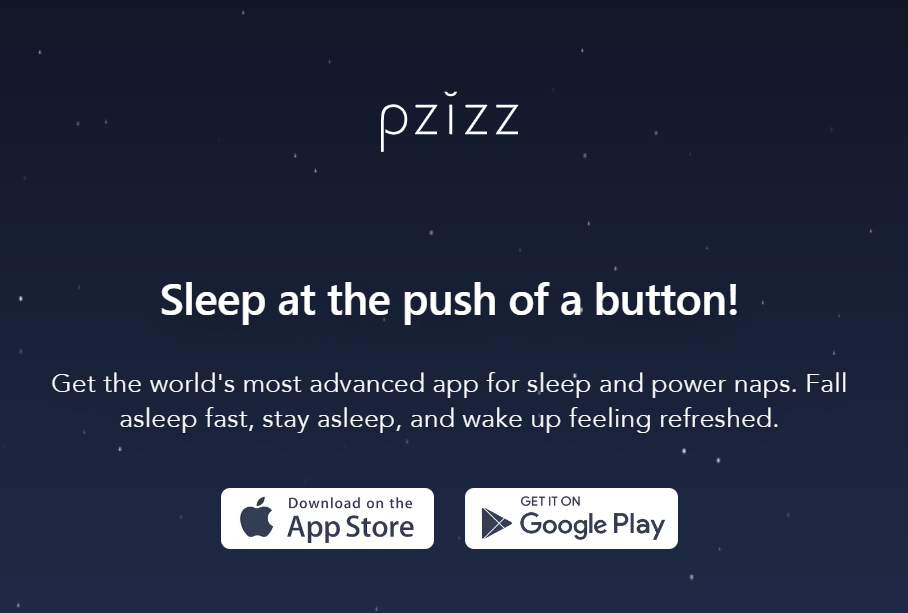
Source: Pzizz Official Website
Though Pzizz has many stories and soundscapes like other sleep apps, its content delivery takes a different path.
Pzizz uses an algorithm so that every night, the music, narrations, and sounds you hear automatically change. The algorithm alters your stories and soundscapes based on your previous content selections and proven clinical sleep interventions.
Despite the app’s reliance on automation, you can still customize the content to some extent. For instance, you can change the gender, volume, or 3D effect of the voiceover. You can also control many parameters of the music separately.
And even if you don’t have an internet connection, you can still access all the app’s content and features.
Despite the clear advantages of Pzizz in terms of science and innovation, the app is not without its downsides. Some users claim that you need earbuds to maximize enjoyment of the app, which could pose problems if you are susceptible to ear infections. But this drawback is not a no-win situation, given that medical experts have come up with measures for preventing these infections.
Aside from this, the app’s premium subscriptions renew automatically, which could inconvenience you if you want tighter control over your budget.
Limitations aside, Pzizz is an innovative app that leverages sleep science and advanced digital technology to provide a unique sleep-enhancing experience.
Pricing:
- Free (limited content)
- Monthly: $7.99
- Annual: $49.99
Pros:
- Offline functionality
- Distinct customizability of musical and narrative settings
- Automated and tailor-fit remixing of audio content every night
- Science-based content for sleep enhancement
Cons:
- Auto-renewing subscriptions could be a problem for budget-conscious users
- Need for earbuds could jeopardize users prone to ear infections
Device compatibility:
📲 Android, iOS
Relevant app links:
💡 Learn about the App Via Official Website
👉 Download Mobile App Via Google Play
👉 Download Mobile App Via App Store
Sweet dreams are made of these
We hope the best sleep apps featured in this blog could gently ease you into the world of sweet dreams. When choosing the right sleep app, though, make sure to consult with your trusted healthcare professional and select the app that fits your budget and needs.
Sweet dreams also come when budgets meet necessities. The people who developed these sleep apps now enjoy this balance partly because they had an idea of how to solve a pressing health problem.
Do you have an idea for addressing a problem that plagues your community or the planet?
An idea is not useless when you have a plan of action. One of the best ways you can realize your vision is through setting up an app business.
And if you decide to go on this path, rest assured you’re not alone.
Many of our clients had no idea how to program applications. But once they took advantage of our app design and development resources, their vision rapidly grew into a valuable asset.
If you have a great idea or solution but don’t know how to implement it, don’t sleep on it. Book a free consultation with us and let’s see how far your idea can go.
Awaken your awareness about how tech drives well-being through our reviews of various health and fitness apps!
- 5 Best Meditation Apps
- 6 Best Yoga Apps
- 6 Best Fitness Tracker Apps
- 5 Best Intermittent Fasting Apps
- 7 Best Workout Apps to Help You Sweat Smarter
- 6 Best Running Apps

Jesus Carmelo Arguelles, aka Mel, is a Content Marketing Specialist by profession. Though he holds a bachelor’s degree in business administration, he also took courses in fields like computer troubleshooting and data analytics. He also has a wealth of experience in content writing, marketing, education, and customer support.


